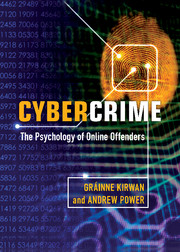Book contents
- Frontmatter
- Contents
- Detailed contents
- List of illustrations
- List of tables
- Preface
- 1 Psychology of cybercrime
- 2 Cybercrimes and cyberlaw
- 3 Hackers
- 4 Malware
- 5 Identity theft and fraud
- 6 Child predation and child pornography online
- 7 Cyberbullying and cyberstalking
- 8 Digital piracy and copyright infringement
- 9 Cyberterrorism
- 10 Crime in virtual worlds
- References
- Index
8 - Digital piracy and copyright infringement
Published online by Cambridge University Press: 05 July 2013
- Frontmatter
- Contents
- Detailed contents
- List of illustrations
- List of tables
- Preface
- 1 Psychology of cybercrime
- 2 Cybercrimes and cyberlaw
- 3 Hackers
- 4 Malware
- 5 Identity theft and fraud
- 6 Child predation and child pornography online
- 7 Cyberbullying and cyberstalking
- 8 Digital piracy and copyright infringement
- 9 Cyberterrorism
- 10 Crime in virtual worlds
- References
- Index
Summary
Case studies
Brenda loves to listen to upcoming bands online. When she finds a new band that she likes, she joins their fan pages on social networking sites, downloads images of them to use as backgrounds on her phone and laptop, and writes positive reviews about them on her blog. However, as she has limited income, she doesn’t actually buy their music, either on CD or as a download – instead she finds their music on file-sharing websites and downloads it for free. While she knows this is wrong, she justifies it by telling herself that she introduces the artists to a new group of fans via her blog, and that in the long run, they’ll make money from her actions.
Greg enjoys films and the latest television shows. Rather than pay for a subscription to a television service, or buy box-sets, he prefers to download the content from the internet. While he knows that this is illegal, he feels that it's unlikely that he’ll be caught. Even if he is, he thinks that he probably won’t be punished because all of his friends also download copyrighted work from the internet, and he feels that they can’t all be prosecuted. He thinks that anyone who pays for a television service, and then watches the programmes with advertisements, is an idiot, as he can download an ad-free version from the internet within hours of the programme first being aired.
- Type
- Chapter
- Information
- CybercrimeThe Psychology of Online Offenders, pp. 169 - 188Publisher: Cambridge University PressPrint publication year: 2013



